In a victory for the federal government's bulk collection of telephone call data, a federal appeals court on Friday tossed out an earlier ruling that said the program should be stopped.
By a vote of 2-1, a three-judge panel of the US Court of Appeals in Washington, DC sent the case back to the trial judge, but in doing so severely weakened the lawsuit that brought the challenge to court.
The appeals court said the challengers failed to demonstrate that they were directly injured by the phone data program, a requirement they had to meet in order to have the legal standing to get their case heard.
Under the program, telephone companies are required to give the government certain customer data — phone numbers dialed and length and time of calls. The information is stored in a massive government database and can be checked with the permission of a federal intelligence court when there's a suspicion that a phone number is associated with a terrorist organization.
Larry Klayman, a Washington, D.C. lawyer who wanted to stop the government from collecting data about his calls, filed the lawsuit. In December 2013, a federal judge granted Klayman's request for an order barring the government from conducting the program.
The judge at the time put a hold on his own ruling to give the government time to appeal, but the order strongly suggested that the program was an unconstitutional invasion of privacy.
Friday's ruling said that while Klayman showed that the government collected data on calls by Verizon Business customers, he and the other challengers were customers of Verizon Wireless and therefore lacked proof that the program harmed them.
The appeals court said nothing about the constitutionality of the phone metadata program and returned the case to the trial judge, leaving the future of the legal challenge very much in doubt.
Klayman could now try to force the government to disclose that it collects data on Verizon wireless customers like him. But one of the appeals court judges noted that the government could invoke secrecy laws and refuse to divulge that information.
And the phone data program is about to undergo a profound change, anyway, under a law passed earlier this year by Congress. Starting in November, the phone companies themselves — not the government — will store the data.
The Obama administration has argued that the change will eliminate the main challenge to the program, namely that the government's collection of the data was an unconstitutional search.

